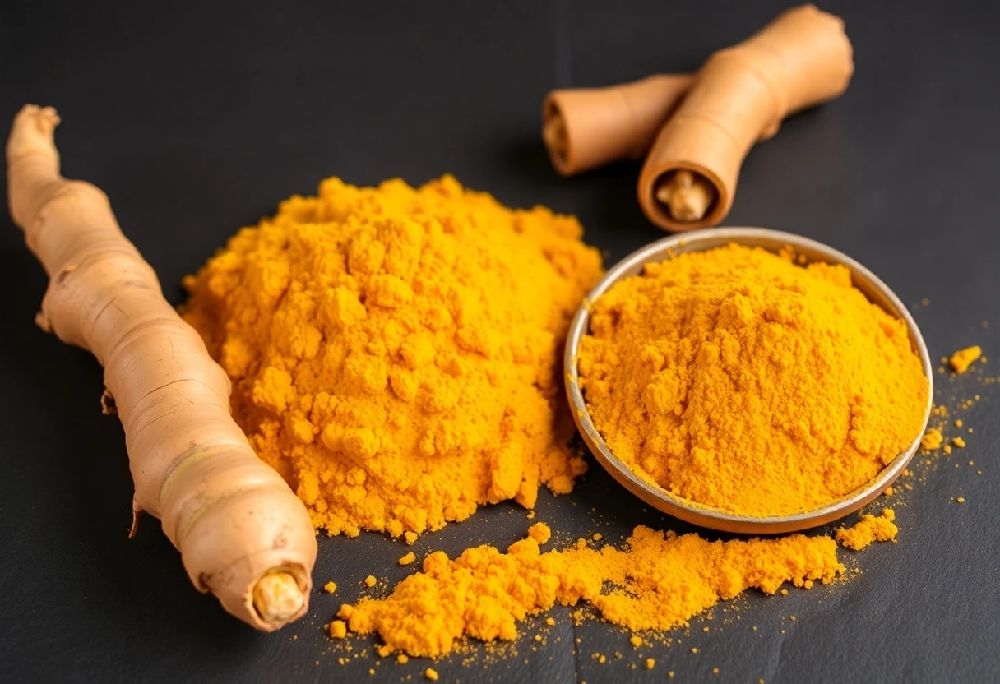
Turmeric, often referred to as the "Golden Spice," has been a staple in Ayurvedic and traditional Chinese medicine for thousands of years. This vibrant yellow root is not just a culinary delight but also a powerhouse of health benefits, thanks to its active compound, curcumin.
The Power of Curcumin

Curcumin, the primary active ingredient in turmeric, is a remarkable compound that has captured the attention of both traditional healers and modern scientists. This potent substance is responsible for most of turmeric's medicinal properties and has been the subject of numerous scientific studies.
Key Properties of Curcumin:
- Anti-inflammatory: Curcumin has powerful anti-inflammatory effects, potentially matching the effectiveness of some anti-inflammatory drugs without their side effects.
- Antioxidant: It neutralizes free radicals and stimulates the body's own antioxidant enzymes.
- Brain Function Booster: Curcumin may increase levels of brain-derived neurotrophic factor (BDNF), linked to improved brain function and a lower risk of brain diseases.
- Heart Disease Fighter: It may help improve the function of the endothelium (the lining of blood vessels), reducing the risk of heart disease.
Despite its potency, curcumin is poorly absorbed into the bloodstream. However, its absorption can be enhanced by consuming it with black pepper, which contains piperine, a natural substance that enhances curcumin absorption by 2000%.
Health Benefits of Turmeric

Turmeric, the golden spice that gives curry its yellow color, has been used for centuries in traditional medicine. Modern scientific research has now confirmed many of its health benefits, primarily due to its active compound, curcumin. Let's explore some of the remarkable health benefits of turmeric:
1. Powerful Anti-Inflammatory Effects
Chronic inflammation contributes to many common Western diseases. Curcumin can suppress many molecules known to play major roles in inflammation. In some studies, its effectiveness has compared favorably to anti-inflammatory pharmaceutical drugs, without the side effects.
2. Strong Antioxidant Capacity
Curcumin is a potent antioxidant that can neutralize free radicals due to its chemical structure. Moreover, it boosts the activity of your body's own antioxidant enzymes. This dual action makes it a powerful defender against oxidative damage, which is believed to be one of the mechanisms behind aging and many diseases.
3. Improved Brain Function
Curcumin has been shown to increase levels of brain-derived neurotrophic factor (BDNF), a type of growth hormone that functions in the brain. By doing so, it may be effective in delaying or even reversing many brain diseases and age-related decreases in brain function. It may also improve memory and make you smarter, potentially lowering the risk of brain diseases like Alzheimer's.
4. Lower Risk of Heart Disease
Heart disease is the number one cause of death in the world. Curcumin may help reverse many steps in the heart disease process. It improves the function of the endothelium, which is the lining of blood vessels, and is a potent anti-inflammatory agent and antioxidant. Studies suggest that it may be as effective as exercise in improving heart health.
5. Potential Cancer-Fighting Properties
While more research is needed, several studies have shown that curcumin can affect cancer growth, development, and spread at the molecular level. It may contribute to the death of cancerous cells and reduce angiogenesis (growth of new blood vessels in tumors) and metastasis (spread of cancer).
These are just a few of the many potential health benefits of turmeric. It's important to note that most studies have used turmeric extracts that contain mostly curcumin itself, with dosages usually exceeding 1 gram per day. It would be very difficult to reach these levels just using turmeric as a spice in your foods. That's why many people choose to take turmeric supplements to get the full benefits.
How to Incorporate Turmeric into Your Diet
While turmeric is commonly used in cooking, especially in Indian cuisine, you can also take it as a supplement. Here are some ways to include more turmeric in your diet:
- Add it to scrambled eggs, frittatas, or tofu scramble
- Blend it into smoothies
- Use it in soups, stews, and curries
- Make golden milk by mixing turmeric with warm milk and honey/Saffron
- Take a high-quality turmeric or curcumin supplement
It's worth noting that curcumin is poorly absorbed into the bloodstream. However, consuming black pepper with turmeric enhances the absorption of curcumin by 2,000%. Many turmeric supplements include a compound called piperine, which is naturally found in black pepper, to enhance absorption.
